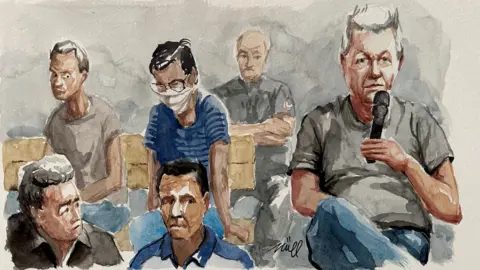Judge rules public can view French mass rape trial video evidence. A French judge has ruled that video evidence from a high-profile mass rape trial can be viewed by the public, raising debates about transparency, justice, and the privacy of victims involved in sensitive legal cases.

Warning: This story contains distressing details from the start.
French mass rape trial video evidence
A French judge has reversed a ruling in the trial of a man who is accused of drugging his wife to sleep and recruiting dozens of men to abuse her for over a decade. Lawyers for Gisèle Pelicot, 72, had earlier appealed against the judge’s initial decision to only show video of the crimes to lawyers and the jury.
She has waived her right to anonymity in the trial, enabling the shocking details of the case to be heard in public. Her lawyers argued the video should be seen to draw attention to the use of drugs to commit sexual abuse. They hailed the latest ruling as a “victory”. Dominique Pelicot, 71, recorded many of the crimes committed against his now ex-wife on video and he has admitted the charges against him.
However, French mass rape trial video evidence
50 other men are accused of rape alongside him and the videos are considered significant elements in the case. The judge announced on Friday that before the images were screened there would be an announcement in the courtroom “allowing people of a sensitive disposition and minors to leave”. He added that the video evidence screened would “not be systematic” and would only be shown when it was “strictly necessary for exposing the truth” at the request of one of the parties.

The judge last month banned the broadcasting of such footage to the public and press on the grounds that the images were “shocking and indecent”. However, he decided to lift the restrictions following calls from Ms Pelicot’s lawyers for the trial to be open to the public. “If these same hearings, through their publicity, help prevent other women from having to go through this, then she will find meaning in her suffering,” one of Ms Pelicot’s lawyers, Stéphane Babonneau, said.
Mr Babonneau called the ruling “a victory in a fight that should not have been fought”, adding that rape victims had for decades in French law had the right to decide whether proceedings should be public. The French press also campaigned for the ruling to be overturned. The judicial press association (APJ) warned of a “serious attack” on freedom of information. The screening of video evidence was strongly opposed by lawyers for some of the 50 co-defendants who are accused of raping Mr Pelicot’s ex-wife. “Justice does not need that in order to proceed, what is the point of these revolting screenings?” said lawyer Olivier Lantelme.
The French public have been shocked by the number of men involved in the case. Police were only able to identify 50 suspects out of the 83 that appeared in Dominique Pelicot’s videos. Their ages range from 26 to 68 and they hail from all walks of life – firefighters, pharmacists, labourers and journalists. Many are fathers and husbands. Of the other men accused, 15 admit rape, but all the others admit only to taking part in sexual acts.
The judge’s decision to allow the public to view video footage as evidence in a mass rape trial in France is a controversial but important step in the context of legal transparency. On the one hand, it highlights efforts to ensure that the judicial process remains open and accountable, especially in cases with high social impact. The public has the right to see justice served in an honest and open manner.
However, this decision also opens up a discussion about protecting the privacy of victims. In sensitive cases such as rape, allowing public access to evidence could risk exacerbating the trauma of victims or deterring them from coming forward in the future for fear of overexposure. It is important to strike a balance between judicial transparency and protecting the rights of the individuals involved, especially victims of sexual crimes.

